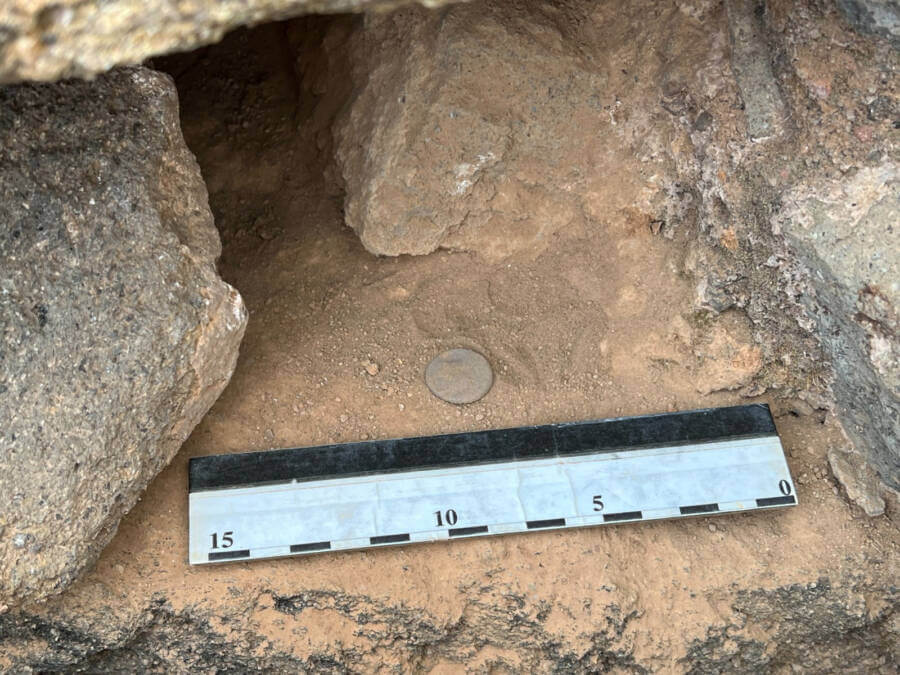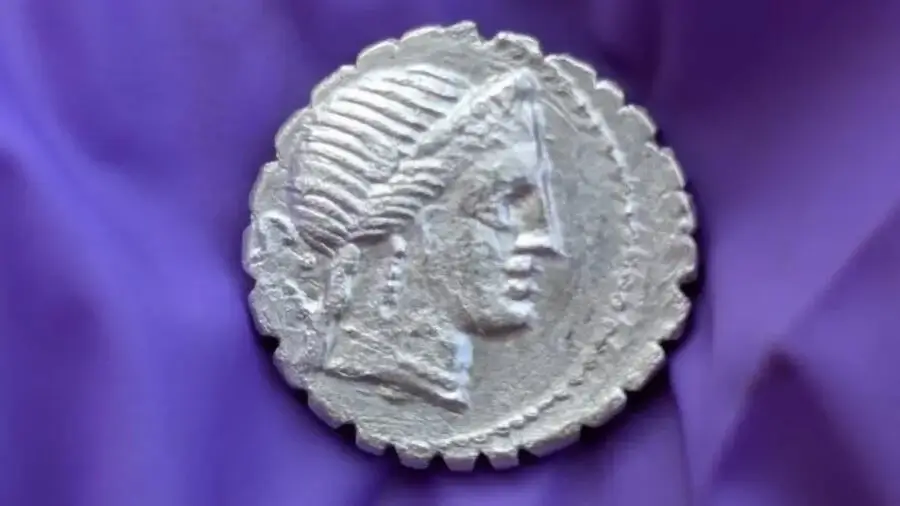Hidden beneath layers of dirt and time, a 2,000-year-old stash of Roman coins has been discovered on the Sicilian island of Pantelleria, a find steeped in history and mystery. This small, volcanic island—located between Sicily and Tunisia—might seem unassuming today, but its past tells a far more dramatic story.
The treasure, consisting of 27 silver denarii, offers a glimpse into the ancient world, one filled with pirate raids, Roman wars, and desperate attempts to safeguard wealth from the unknown. But how exactly did this hoard end up buried in an earthen wall and under a boulder? And why was it left behind, never to be retrieved—until now?
The Roman Coin Discovery: What Happened?
Imagine this: heavy rains have just drenched the rugged cliffs of Pantelleria. A section of an ancient earthen wall, weakened by the relentless downpour, suddenly gives way. As the soil crumbles, something glittering is revealed—Roman silver denarii, hidden for millennia.
This is exactly what happened on Pantelleria. Archaeologists, already working on the restoration of the Acropolis of Santa Teresa and San Marco, were left stunned by the appearance of 27 coins, dated between 94 and 74 B.C.E. These treasures had been silently waiting, hidden away during a chaotic and dangerous time.
The Acropolis, an ancient stronghold, had witnessed pirate attacks, battles, and the rise and fall of empires. Pantelleria may seem remote today, but 2,000 years ago, it was a key player in the Mediterranean world.
Pantelleria: A Hotspot of Archaeological Finds
Pantelleria, a mere dot on the map, has proved to be a treasure trove for archaeologists. This isn’t the first time valuable Roman artifacts have been found here. In 2010, a similar stash of 107 coins was discovered nearby. The island’s rich archaeological history is marked by the excavation of marble busts of iconic figures such as Julius Caesar and the Roman emperor Titus.
According to Thomas Schäfer, the University of Tübingen archaeologist leading the current project, the coins were likely stashed away in a moment of urgency. Pirate attacks plagued the region during the Roman Republican age, a time of political instability and maritime threats.
“There were frequent raids against the villages along the coast, and it is easy to imagine that someone hid their nest egg when the ships arrived, without being able to recover it,” notes a government statement.
It’s an image that brings the ancient world to life: a terrified villager, hearing the distant sounds of pirate ships, desperately burying their wealth and fleeing—never to return.

Pirate Raids and the Roman Navy: The Context
In the first century B.C.E., the Mediterranean was far from a peaceful place. Roman statesman and general Gnaeus Pompeius Magnus—better known as Pompey—was engaged in a fierce struggle to rid the seas of pirates. These marauding bands preyed on coastal towns, capturing slaves, plundering wealth, and spreading fear.
Pantelleria’s strategic location between Sicily and North Africa made it a prime target for pirate raids. As Schäfer pointed out, pirate ships frequently terrorized the coasts. It’s highly probable that the coins were hidden by someone hoping to retrieve them once the danger had passed. However, as history shows, sometimes the danger never truly passes.
What Makes These Coins So Special?
Beyond the fact that they are over 2,000 years old, these coins tell a story of trade, politics, and survival. Minted in Rome, each silver denarius carried the weight of the Roman economy, circulating through markets, trades, and potentially even bribes.
The coins themselves are a testament to the interconnectedness of the Roman Republic. They suggest commercial activity on Pantelleria and possibly even ties to Rome’s wider Mediterranean interests. Francesco Paolo Scarpinato, Sicily’s Cultural Heritage councilor, emphasized that this discovery offers valuable clues about the political and economic relationships that defined the Mediterranean in the Republican era.
“These coins,” Scarpinato remarked, “give us precious information about the commercial contacts and political events that shaped the Mediterranean during this time.”
Pantelleria: A History Hidden Beneath the Surface
The island of Pantelleria, though small and often overlooked, holds centuries of history beneath its surface. The Acropolis of Santa Teresa and San Marco, where the coins were discovered, has been excavated for over 25 years, with astonishing results. Archaeologists have uncovered a rare “comitium,” a space used for gatherings by elected representatives and Roman cavalry officers. Schäfer noted that this particular comitium is one of only five in Italy, and the best-preserved of the lot.
Pantelleria’s strategic location meant that it was always more than just a quiet, remote island. It was a crossroads of cultures, political ambitions, and military conflict. The fact that it has yielded not only coins but also marble busts and Roman architecture highlights its significant role in the ancient world.
Recent Archaeological Finds: A Treasure Trove
The discovery of these Roman coins is just one of many remarkable finds in the region. From the unearthing of a large cache in Claterna to the treasures found in Livorno and Sardinia, Italian soil has been remarkably generous in recent months.
While these coins hold immense historical value, they are part of a larger picture. They join the other artifacts found across Italy that collectively offer new insights into the Roman Republic and the interconnected Mediterranean.
What’s Next for Pantelleria?
As more artifacts continue to emerge from the soil, the island’s historical significance only grows. Schäfer and his team will continue their excavation work at the Acropolis, hoping to uncover even more relics of Pantelleria’s past.
For now, though, these 27 Roman coins serve as a reminder of a world long gone but not forgotten. Each coin, weathered and tarnished by time, tells a story of trade, wealth, and the chaos of a pirate-infested Mediterranean.

